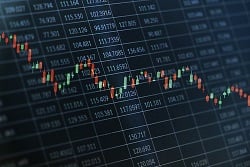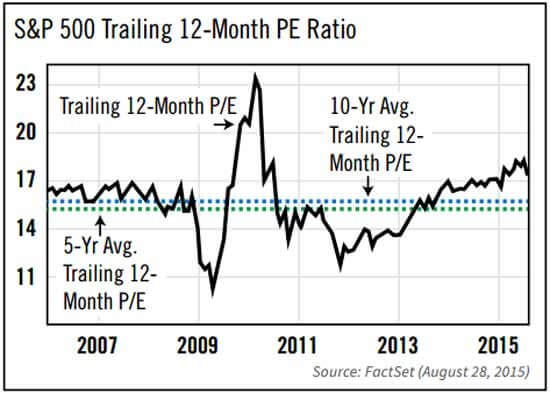Having experienced their first true stock market correction in four years - and the potential beginnings of a rebound in the three weeks since - investors are naturally asking whether now is a good time to buy stocks ahead of the Fed meeting tomorrow.
You can see why it might be attractive to "buy the dip."
After all, buyers of previous dips have been met with success, as the major stock indices have hit one new high after another since the financial crisis.
Plus, this "buy the dips" mentality has been reinforced by the financial media and Wall Street, which have cheered on the post-crisis rally with little attention to the reasons why stock prices have risen steadily over the last four years.
If you really want to buy stocks right now, I've got one question for you first.
Here's What Caused the August Sell-Off
 First, let's look at what caused the August sell-off in stocks that sent the S&P 500 down 6.2%.
First, let's look at what caused the August sell-off in stocks that sent the S&P 500 down 6.2%.
While one single factor wasn't responsible for the drop, the biggest contributor was undoubtedly the move by China to devalue its currency. While the devaluation itself was relatively minor (only a couple of percentage points), it signaled that Chinese authorities viewed the collapse of China's stock market bubble as an admission that the country's economy was far weaker than it had previously admitted.
In fact, China's stock market bubble was the third stage in China's efforts to inflate its economy since the financial crisis. All three stages involved an epic build-up of debt that was unsustainable and has now likely come to an end. The first two stages were an enormous real estate expansion and massive offerings of financial products through the country's shadow banks. Both activities involve out-of-control speculation financed by debt that has little chance of being repaid.
U.S. stock investors were willing to ignore the collapse of China's stock market bubble. After all, it was a bubble, and bubbles burst. They were even willing to ignore signs that the U.S. Federal Reserve would raise interest rates by 25 basis points as soon as September. After all, it's only 25 basis points. But when China devalued its currency without warning, it freaked them out. It told them that China's wise men, who had already stumbled badly in handling their stock market collapse, were seriously worried about the country's economy.
And they should be.
Since 2007, total debt in China has quadrupled from $7 trillion to $28 trillion, according to the McKinsey Global Institute. This leaves an economy 60% the size of the United States with much more debt than this country, which is clearly unsustainable. When the stock market cracked, it was game up. China decided it had to devalue its currency in a last-gasp effort to keep itself afloat.
But it isn't going to work.
China's exports to Asia have also been battered by the cheaper yen, which is being weakened by the policies of the Japanese government known as Abenomics. Abenomics has driven the yen down against the dollar, but much more against the yuan. As a result, a currency war is raging in Asia that has hurt China as well as North Korea. China is getting hit from all sides.
The problem with China hitting an economic wall is that China has been the major engine of global economic growth since the financial crisis. It has been the marginal buyer of global commodities such as iron ore, aluminum, copper, and other metals, as well as a major consumer of oil. When China's economy started flailing in mid-2014, global commodity prices started their sharp decline that has cut their prices in half (or more) since then.
The Big Question: What Forces Could Push Stocks Back Up?
The top question investors should be asking themselves is what could buoy stocks from here.
Remember, the last time stocks corrected and sold off by 10%, it was caused by the European debt crisis in the summer of 2011. The world's central banks still had tools that they could use to bail out the markets. And they did.
Today, the situation is different. Central bank hocus-pocus may not be able to work its magic the way it used to.
This is "Super Crash Inevitability No. 4."
Central banks are actively debauching the value of fiat currencies with QE and money printing. Meanwhile, they have artificially suppressed interest rates to levels that render fixed investments confiscatory of capital in nominal and real (i.e. inflation-adjusted) terms. All this has been an attempt to stimulate growth, but now central banks have no cards left to play. This is "the terminal stage of monetary policy." With interest rates at zero, and its balance sheet stuffed with debt, the Federal Reserve can't do much more to stimulate growth or bail out markets when they collapse.
There's another "Inevitability" at play here, too...
Almost Everything Is (Still) Overvalued
Value and fundamentals are not in favor of a strong rebound, either.
At the time of the August sell-off, U.S. stocks were priced at levels that had little tolerance for any kind of bad news.
Before the correction, the forward price/earnings ratio, the Schiller Cyclically Adjusted Price/Earnings Ratio, and the S&P Market Capitalization/GDP Ratios were all far above historical averages.
And they still aren't cheap.
- The forward earnings ratio was trading at 17.5x before the correction; now it is trading at 15.1x, which is still above its 10-year median.
- The Shiller Cyclically Adjusted Price/Earnings Ratio was trading at 27x before the correction and is now trading at 24.7x, but its mean is a much lower 16.6x.
- And the S&P Market Capitalization/GDP Ratio was trading at nearly 1.3x before the correction and has now dropped to 1.14x, but both are much higher than the historical average of 0.75x.

So even with significant numbers of stocks having traded down 10% and even 20% from their recent highs, the market is still not cheap. And the sectors that are cheap - energy and commodities - are cheap with good reason. Oil prices have retraced their lows of early this year but could easily move lower as Iranian oil enters the market and a stronger dollar maintains pressure on prices. The stronger dollar will also maintain pressure on the rest of the commodity complex, along with economic weakness around the world.
[mmpazkzone name="in-story" network="9794" site="307044" id="137008" type="4"]
Furthermore, the most speculative sectors of the market - social media and biotech stocks - haven't cracked. The most expensive stocks are still significantly overvalued. Tesla Motors Inc. (Nasdaq: TSLA), Netflix Inc. (Nasdaq: NFLX), Amazon.com Inc. (Nasdaq: AMZN), and the iShares Nasdaq Biotechnology ETF (Nasdaq: IBB) are just some of the stocks that have risen sharply this year beyond any relationship with fundamentals.
As I wrote in my Super Crash Report, there are too many headwinds facing stocks right now - overvaluation, global economic weakness, geopolitical instability.
In general, equities are going down.
Here's What to Do
For these reasons, it is too early for investors to take advantage of the first correction in four years to "buy the dip."
I recommend that investors allocate no more than 20% of their portfolio to equities right now. But there is a caveat - 20% provided they are prepared to treat this as a "buy and hold" investment and are disciplined enough not to trade the portfolio.
As David Rosenberg of Gluskin Sheff teaches, it is time "in" the market rather than "timing" the market that generates solid equity returns. This requires patience and discipline. Over long periods of time (decades), equities should continue to generate high single-digit total rates of return (consisting of capital gains plus dividends).
There will be opportunities in equities, and we'll track them together here at Sure Money.
But simply buying the dip is not a winning strategy - not anymore.
Follow us on Twitter @moneymorning.
Editor's Note: You can expect the volatility we're experiencing now to accelerate through the end of 2015 and beyond. That's why Michael Lewitt launched Sure Money - to make sure investors are protected from these plunging markets while capturing every last cent of profit. Click here to get Sure Money twice each week at no charge, and you'll get all of the actionable protective moves and profit recommendations (yes, there is upside) contained in his Super Crash Report.
About the Author
Prominent money manager. Has built top-ranked credit and hedge funds, managed billions for institutional and high-net-worth clients. 29-year career.



